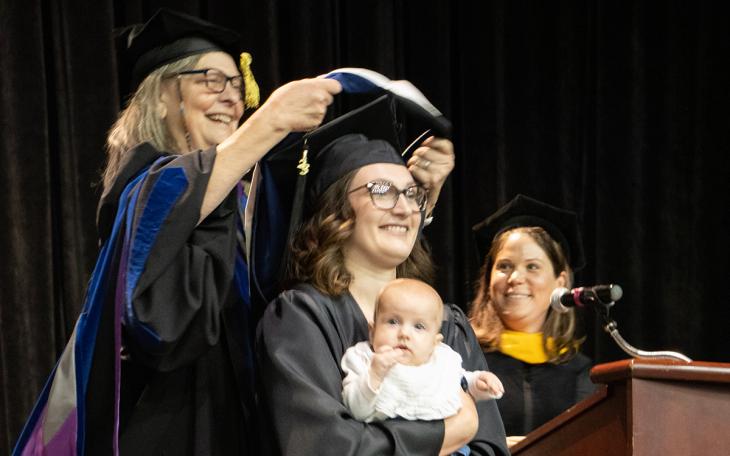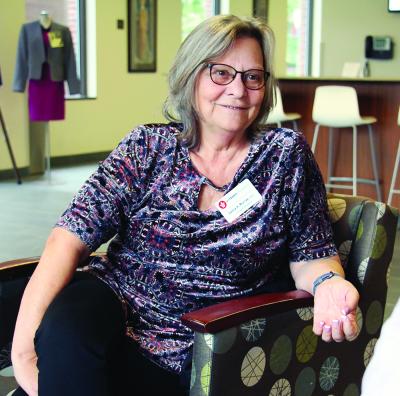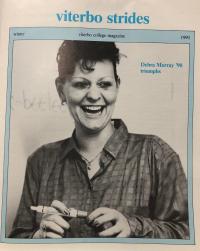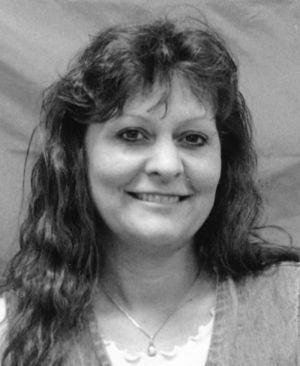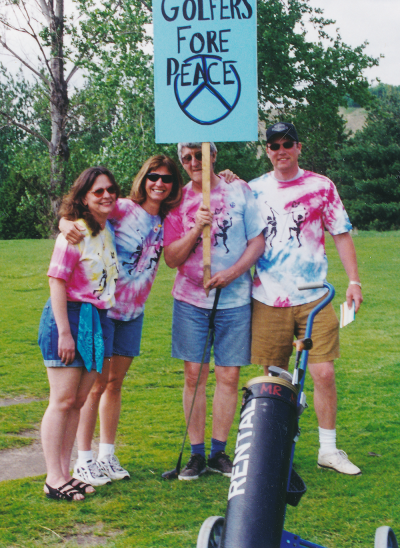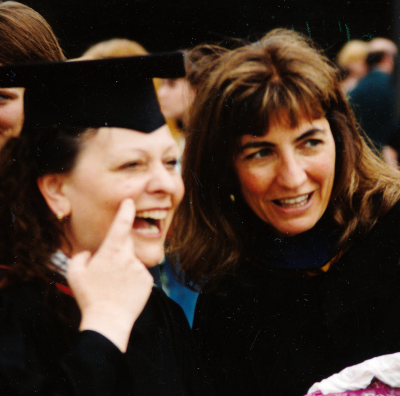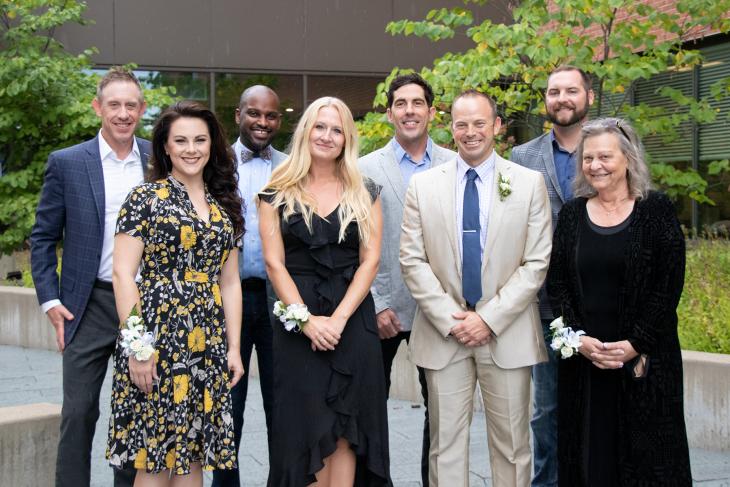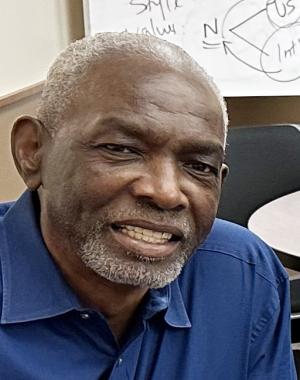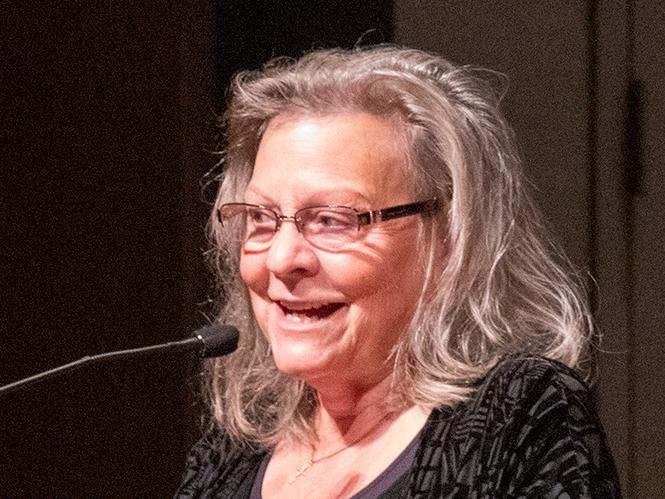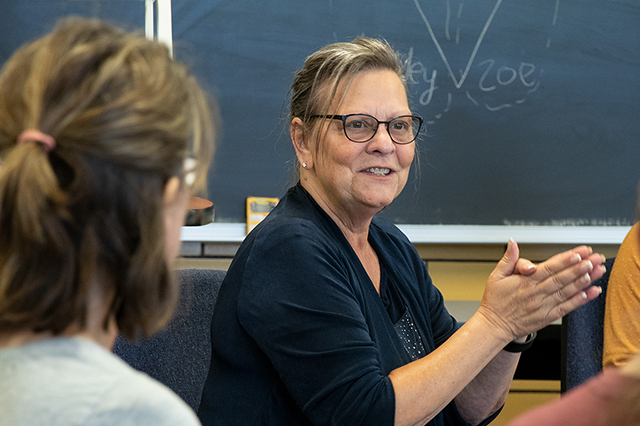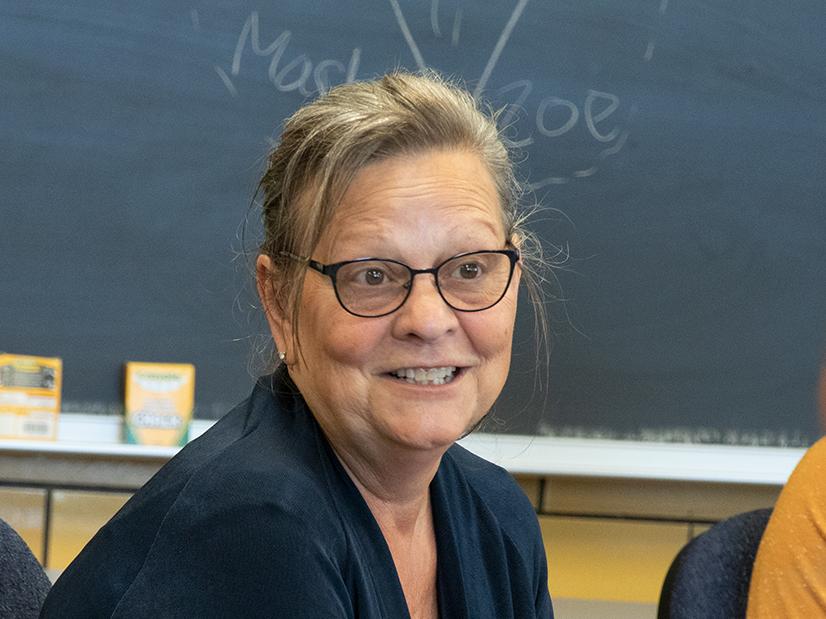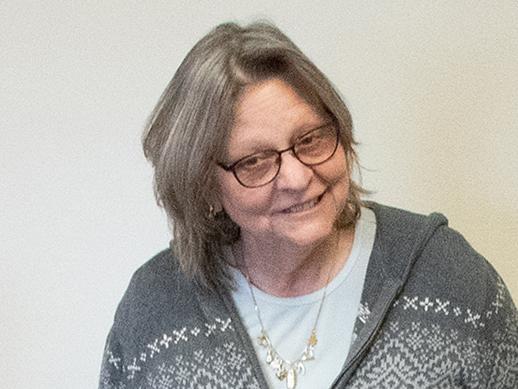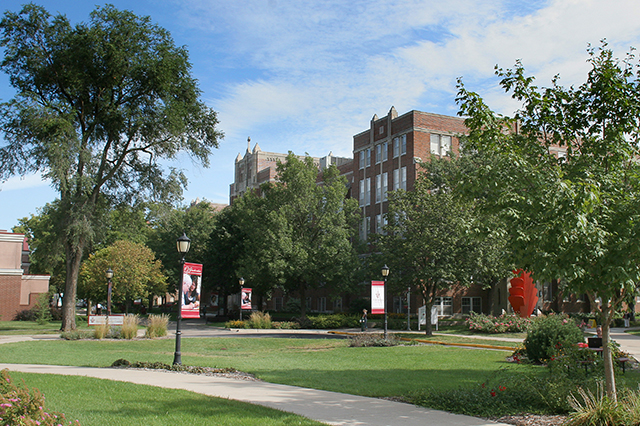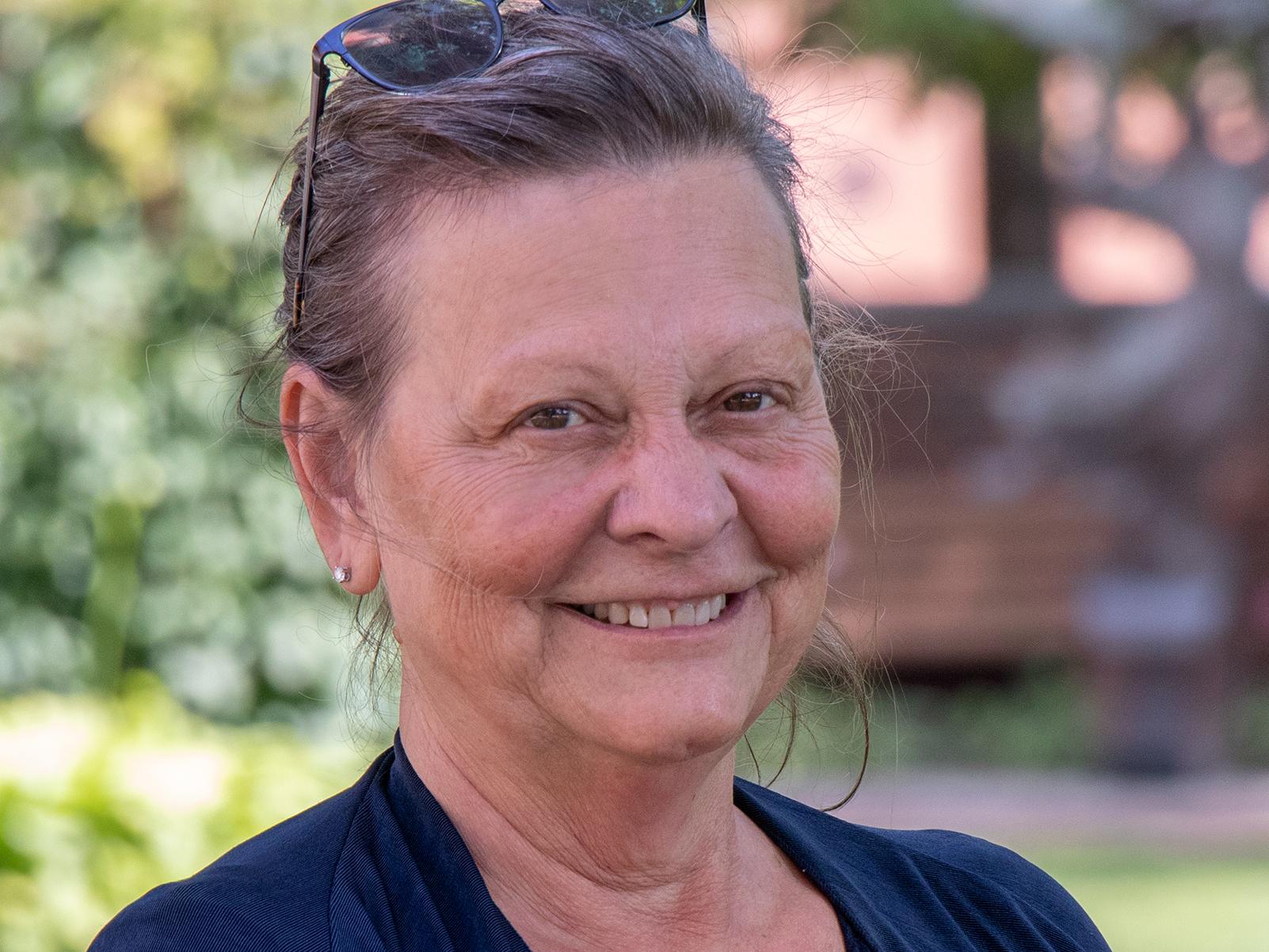Given Deb Murray’s seemingly boundless energy and undying affection for Viterbo, many colleagues and students were surprised at the news of her retirement as director of the university’s graduate mental health counseling degree programs.
Murray has been a fixture on the Viterbo campus since the mid-1980s, when she came here as a nontraditional, first-generation college student. After completing her bachelor’s degree in psychology in 1990, she was back four years later, teaching a couple classes for a year before joining the faculty full-time in 1995.
Those who know Murray wouldn’t have been surprised to see her edge into a sixth decade at Viterbo before calling it quits. A few years ago, Murray could have pictured that, but the last few years have been hard and full of grief. She lost her mother, Maxine, at the end of 2020, three years after the death of her father, Michael. Then she lost her daughter early in 2021, and her son died in January of this year.
“At this point it feels like it’s time for me to have a simpler life, but I’m not done yet. I’m going to go and serve the underserved, the way the Sisters always have,” Murray said. “I’m going to go back to where I started, back into counseling. That’s where you see miracles.”
She’ll be working part-time as a counselor at Scenic Bluffs Community Health Centers in Cashton. “That’s the best place I could find where I can serve the underserved,” she said. “I would be very afraid of retiring and not doing anything. This will give me a little more time to regain my balance.”
Murray’s Viterbo journey is peppered with instances of unexpected good fortune, little miracles that put her in the right place at the right time or put in her path the people she needed. “I came here broken, and I was given by the Sisters everything I needed to grow and develop,” she said. “They are embedded in the way I teach, in the way I counsel, and hopefully in the way with all people.”
The Monday morning after taking part in her last commencement ceremony as a faculty member, Murray was in her fifth-floor Murphy Center office, taking a break from packing up her things to reflect on her time at Viterbo.
“I will miss the students greatly,” she said. “I think I can walk away and definitely know that I did what was mine to do, but I definitely didn’t do it all by myself.”
Finding Her Path
Murray came to La Crosse from Des Moines, Iowa, where she grew up the eldest of six children. She came here as a cancer survivor with two young children seeking refuge from an abusive husband and treatment for an addiction to the prescription drugs she had turned to as a coping mechanism.
In time, she decided college was the way to lift her and her children out of the paycheck-to-paycheck grind. She tried applying at the University of Wisconsin-La Crosse and got no traction. With classes starting in just a few weeks, she came to Viterbo hoping to see an admissions counselor.
She didn’t have an appointment, but she got to talking to another woman who did have one, and she insisted that Murray take her place. “She said, ‘You need it more than me,’” Murray recalled.
Murray’s good luck got better. The admissions counselor, Debra Randall Anderson, was working on her master’s degree, and as part of that she was conducting an intelligence testing study. Anderson asked Murray to take the test, to which she reluctantly agreed. “My life was in ruins. I was feeling so dumb,” Murray said.
To Murray’s surprise and Anderson’s delight, Murray scored extremely high. She didn’t have the money to enroll, but Anderson steered her to a Viterbo program that allowed students to take one course per semester free of charge.
Murray was on her way.
Choices
Taking that first class, the nagging fear that she was going to fail pushed her to work harder, and she excelled. After completing the class, her admissions counselor laid out what it would take for her to get a degree. It seemed daunting, but Murray was used to challenges.
Going in, Murray was dead set on studying psychology and becoming a mental health counselor. By her junior year, she was thinking she wanted to be a teacher instead, but it would have meant a lot of extra time in school to change majors at that point.
Murray stuck with psychology, and after graduation started work on a master’s degree at Saint Mary’s University, while teaching drug and alcohol education classes in school districts for Coulee Recovery Center. Her graduate school internship was at Gundersen Clinic, under the supervision of Harold “Harry” Doweiko, who, unbeknownst to Murray, was the author of Concepts of Chemical Dependency, a textbook she would later assign her students when she began teaching at Viterbo.
“One day, Harry said to me that nurses and doctors only have one class on substance abuse,” Murray recalled. “I said, ‘You mean one course?’ He said, ‘No, I mean a class, one class session on substance abuse. It’d be interesting if someone had a course in substance abuse.’ And I was like, ‘Yes, it would.’”
From that internship on, Doweiko was a valued mentor for Murray, one of many. Viterbo psychology Professor Ron Schafer was another mentor, one who shared Doweiko and Murray’s sense of urgency to get more chemical dependency counselors trained. “Ron says, ‘You know, it only takes six courses for somebody to be able to treat substance abuse. We could put that in the psychology department.’”
And Viterbo did, becoming the first college in Wisconsin where students could become substance abuse counselors. That wouldn’t have happened without the FSPA mission of serving the underserved.
“I credit the Sisters for everything. I would never ever have been allowed to do what I did here without their support,” Murray said. “I mean, what university wants to say they have students who major in substance abuse treatment?”
It’s Who You Know
After completing her master’s degree, Murray was teaching at Viterbo and doing part-time chemical dependency counseling, something she did for 16 of her years teaching at the university. “That was living my best life,” she said.
The trouble was that her teaching contract was year to year. After a few years as an instructor, two of Viterbo’s vice presidents took her aside and convinced her that she should commit to teaching by earning a doctoral degree.
She enrolled in the doctoral program at St. Thomas University in the Twin Cities, trekking back and forth for evening and weekend classes while still teaching at Viterbo. All was going well until the classes were moved from St. Paul to Minneapolis, adding 40 minutes to her drive time.
She started arriving late for class, and the professor finally told her she was at risk of failing the class. Murray was offered a chance at passing if she did a bit of extra credit. The professor tasked her with having a conversation with William Miller, who pioneered the motivational interviewing counseling method on which Murray was doing her doctoral dissertation.
Murray didn’t see how she could make that happen.
She came back to Viterbo and told the chair of the department that her pursuit of a doctoral degree had come to a dead end because there’s no way she could get a chance to talk to Miller. “And he says, ‘Oh, William Miller? He lived right around the corner from me when I went to school.’ He knew how I could get in touch with Miller!”
So Murray did correspond with Miller to the satisfaction of professor, but the benefits of her connection didn’t end with passing a class. Because of her experience as a substance abuse counselor, Miller asked Murray to help with a yearlong study in New Mexico, and when she was done with the study he offered to train her to be a motivational interviewing trainer.
Murray became the first motivational interviewing trainer in the Midwest, helping countless counselors learn a technique that had proven especially effective for working with patients who are angry and don’t want to change. It’s now a major part of the toolkit for mental health counselors.
Murray chose motivational interviewing as her dissertation topic partly because she thought it would be easy. There were just one slim book and 13 controlled studies on it. But then three weeks after she committed to motivational interviewing as a topic, an article was published that got everybody’s attention and it was suddenly a hot topic.
“The next thing you knew, it just blew up. It was being tested everywhere. New studies kept rolling in,” Murray said. “Life is so funny.”
Getting with the Programs
Murray has been a key player in establishing and running Viterbo’s Master of Science in Clinical Mental Health Counseling and Doctor of Education in Counselor Education Supervision degree programs, the latter being the first of its kind in Wisconsin.
The spark for the master’s degree program came after Murray started encountering Viterbo graduates doing counseling internships as part of their graduate degree work at Winona State University. She talked with Schafer, who got on board, surveyed Viterbo alumni about their interest in the program, and, most importantly, checked with area agencies to make sure there would be job opportunities for those who earned their master’s degrees.
“You don’t want to do a program if you can’t get them employed easily,” said Murray, who in the beginning thought the local market for counselors might meet the saturation point in five to seven years, but it still hasn’t. “The students in the program are often hired before they walk across the stage at commencement.”
Murray insisted that the master’s degree program get the seal of approval from the Council for Accreditation of Counseling and Related Educational Programs (CACREP), the gold standard. To make that happen, Murray had to find a third faculty member who had been educated at a CACREP-accredited university. That’s what brought Professor Jessie Latten to Viterbo from Birmingham, Ala.
“I don’t even know how to imagine what it will be like without her now. She is more than a mentor, a friend, and a director. She has looked out for us ever since we got here. It’s hard to put into words what she means to me and my family,” Latten said. “She is a jewel. I think Viterbo knows that it has that jewel forever. Her heart is here, and she would never ever in her heart leave Viterbo.”
The spark for Viterbo’s doctoral program seems to have had a more divine origin. When a Board of Trustees member had to bow out of a 2016 leadership pilgrimage to Assisi, Italy, Murray was tapped as a last-minute substitute, a choice she had to wonder about. “I’m at the end of my career, what am I doing on a leadership program?” she said.
But one day in Assisi, on a day set aside for silent contemplation, she had an epiphany reminiscent of the Lord directing St. Francis of Assisi to “rebuild my church.”
“I was sitting there and I went, ‘No! Oh no, I know what I’m supposed to do. I’m supposed to build a doctoral program,'” said Murray, an affiliate of the Franciscan Sisters of Perpetual Adoration.
Fellow FSPA affiliate and Viterbo faculty member Emily Dykman was on that trip and encountered Murray soon after her epiphany.
“Deb said, ‘It just hit me. Francis was speaking to me and I have a program to build.’ She just knew it had to happen,” Dykman said.
And she did make it happen, launching the university’s second doctoral program in a miraculously short span of time, with the first Viterbo counseling doctoral degree granted in 2021.
The Viterbo Alumni Association recognized Murray’s professional achievements in 2021 with a Distinguished Alumni Award, the latest in a long line of accolades she has earned, including Wisconsin Mentor of the Year (2013) and Counselor Educator of the Year (2018) awards from state associations.
For someone who easily could have taken a path that didn’t involve going to college, it’s remarkable how Murray has mastered the world of higher education, said Dykman, who counts Murray as a valuable mentor and friend.
“The really remarkable thing is she brought so many people along with her. That’s probably what is most profound to me,” Dykman said. “It’s never really been about herself. It was about always building these relationships across different groups. She’s an amazing woman. I’m going to miss her.”

